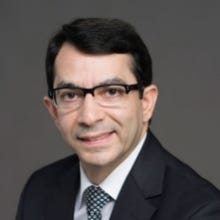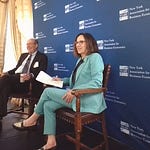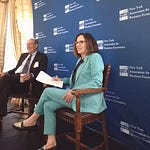Ayan Kose, the World Bank’s deputy chief Economist, is quick to laud the stability of the global economy as 2025 gets underway. His team has just released the World Bank’s Global Economics Prospects Report which predicts it will continue to grow at a 2.7% rate as it has for the past two years.
He credits much of this to “the U.S. economy delivering phenomenal growth, the kind of growth we have not seen actually for a very long time,” this alongside growth slowing in some countries like China.
As much as “the global outlook is stable” he is not so happy with the outlook for poorer, developing nations when he looks at “substantial uncertainty and a balance of risks tilted to the downside.”
So let’s take a look at the issues we discuss and the points Ahyan makes about the challenges that lie ahead.
Three Downside Risks to Global Growth 00:01:58:11 - 00:02:28:16
(1) The first is, of course, the heightened policy uncertainty. This is very important.
(2) It's different than the trade disputes and other important risk between major economies. And finally,
(3) … the geopolitical tensions, including the armed conflict as the first 25 years of the 21st century comes to a close and the
Three risks 00:01:58:11 - 00:02:28:16
(1) The first is, of course, the heightened policy uncertainty. This is very important.
(2) It's different than the trade disputes and other important risk between major economies. And finally,
(3) I … the geopolitical tensions, including the armed conflict.
Growth has slowed impeding development progress 00:02:28:18 - 00:03:03:11
…the near-term forecast, <is> 2.7%. It is 1.4 percentage points lower than the average growth the global economy delivered in the decade prior to the pandemic. The bottom line is that you don't have enough growth to basically see living standards improving at the pace they used to improve. And emerging developed economies are, you know, covering the ground to catch up, to converge to the income levels of advanced economies.
Covid, Inflation, investment, productivity climate change are issues 00:04:10:15 - 00:04:43:02
All of them together took a toll < Covid Inflation and Ukraine war> . But the global economy has remained resilient. There are deeper structural reasons for it why growth has slowed down over time, including what we saw in the case of investment, a sustained slowdown in the case of trade, a sustained slowdown in the case of productivity. We didn't see much of an improvement. And of course, there are these new problems we see, including climate change affecting many economies.
Lots of inflation progress- 00:04:43:04 - 00:05:16:19
The good news is that we think this disinflation process will continue and has, you know, generally continued the up until recently, energy prices were going down. You know, the supply chains are pretty much healing. And the lag, the impact of, of course, the tightening cycle still in place as a result. Kathleen, if you look at the data, what you see is headline inflation by the end of 2024 was at or below our target in over 60% of economies targeting inflation and in most other economies.
Inflation Good News/Bad News: Core Inflation underperforms 00:06:17:08 - 00:06:49:05
Headline inflation at the global level <is expected to> decline to 2.7% this year and next, broadly consistent with target levels in many of the emerging markets. There is one important catch. Core inflation remains <above> below inflation targets in many economies and its decline has been much more gradual and uneven than the decline we saw in headline inflation.
On Alert!! 00:07:17:12 - 00:07:49:19
Central banks need to be on alert. And you see the developments in bond markets signaling evolving changes, reflecting evolving changes in monetary policy expectations this year.
What is driving bond yields 00:09:26:17 - 00:10:01:17
What were the reasons driving the increase in longer term yields? Since the start of the Fed's cutting cycle, <the impact on longer term yields> been very unusual. Part of the increase in the in the in the yields is not related to longer term bonds specifically….Instead, it's a reflection of the unusual economic cycle we have and really changing expectations of what the Fed is going to do in terms of its interest rate part. …mechanically, we know how to think about …these yields. You can decompose them into the expected policy rate part. You know, that's the short rate… <and> the elusive concept, the term premia. These two components account for roughly equal shares of the total increase in yields since the Fed started cutting interest rates. Now, what happened recently, the expected policy rate path was revised markedly upwards due to the strength of the US economy, especially after…robust market data and after basically the Fed started cutting interest rates in September. And the bottom line is that Fed interest rate expectations, the Fed funds rate expectations rose roughly 50 basis points between September and December. In the summary of economy projections of the of the board members.
Uncertainty over tariffs 00:12:23:24 - 00:12:58:08
…another important issue here for the for the world is what's going to happen with tariffs. There's a lot of talk. There are things that are being suggested by the incoming administration. And I think a lot of nobody assumes they know exactly what's going to happen. Right. What is that hanging over the global economy and in particular, the developing economies? Many of them are so dependent on their exports. It has become a cottage industry of scenarios under this tariff scenario.
On an optimistic note you hear why Ahyan developing nations can drive their economic future by making reforms that are within their power and on their radar screens.
H. Ahyan, Kose
Deputy Chief Economist of the World Bank Group and Director of the Prospects Group
Ayhan Kose is the Deputy Chief Economist of the World Bank Group and Director of the Prospects Group. He is a member of the Chief Economist’s leadership team overseeing the Bank’s analytical work, and policy and operational advice. He also leads the Bank’s work on the global macroeconomic outlook, financial flows, and commodity markets. Under his management, the Prospects Group produces the Bank’s flagship reports Global Economic Prospects and Commodity Markets Outlook, in addition to other policy and analytical publications. Prior to joining the World Bank, he was Assistant to the Director of the Research Department and Deputy Chief of the Multilateral Surveillance Division in the International Monetary Fund (IMF). He served in a wide range of roles supporting IMF’s analytical, policy, and operational work.
Mr. Kose has written extensivel on international macroeconomics and finance. His articles have been published in leading academic journals, including the American Economic Review, International Economic Review, Journal of Monetary Economics, Journal of International Economics, Journal of Development Economics, and many others. His latest book, Falling Long-Term Growth Prospects (co-edited), examines the evolution of global potential growth and its underlying drivers. His recent policy work focuses on global inflation, debt challenges, and business cycles.
Mr. Kose is a Nonresident Senior Fellow at the Brookings Institution, a Dean’s Fellow at the University of Virginia’s Darden School of Business, a Research Fellow at the Center for Economic Policy Research (CEPR), and a Research Associate at the Center for Applied Macroeconomics (CAMA). He taught at the University of Chicago’s Booth School of Business, INSEAD, and Brandeis International Business School. He has a Ph.D. in economics from the Tippie College of Business at the University of Iowa and a B.S. in industrial engineering from Bilkent University. A native of Turkey, Mr. Kose was born and raised in Istanbul.














Share this post